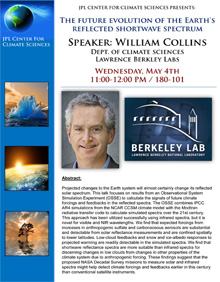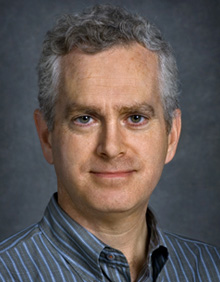Seminars
The Future Evolution of Earth's Reflected Shortwave Spectrum
Dr. William Collins, Lawrence Berkeley National Laboratory; University of California, Berkeley
May 4, 2011 | Jet Propulsion Laboratory, Pasadena, California
About this Lecture

Projected changes to the Earth system will almost certainly change its reflected solar spectrum. This talk focuses on results from an Observational System Simulation Experiment (OSSE) to calculate the signals of future climate forcings and feedbacks in the reflected spectra. The OSSE combines IPCC AR4 simulations from the NCAR CCSM climate model with the Modtran radiative transfer code to calculate simulated spectra over the 21st century. This approach has been utilized successfully using infrared spectra, but it is novel for visible and NIR wavelengths. We find that expected forcings from increases in anthropogenic sulfate and carbonaceous aerosols are substantial and detectable from solar reflectance measurements and are confined spatially to lower latitudes. Low-cloud feedbacks and snow and ice-albedo responses to projected warming are readily detectable in the simulated spectra. We find that shortwave reflectance spectra are more suitable than infrared spectra for discerning changes in low clouds from changes in other properties of the climate system due to anthropogenic forcing. These findings suggest that the proposed NASA Decadal Survey missions to measure solar and infrared spectra might help detect climate forcings and feedbacks earlier in this century than conventional satellite instruments.
About Dr. William Collins

Dr. William Collins is a professor in residence with the Department of Earth and Planetary Science at University of California at Berkeley, where he also serves as a senior scientist at the adjacent Lawrence Berkeley National Laboratory where he heads the Climate Sciences Department. His research focuses on the interactions among clouds, aerosols, greenhouse gases, and climate change. Dr. Collins studies the effects of sunlight and heat on the Earth system using a combination of models, observations, and mathematical theory. Dr. Collins was lead author for the Fourth Assessment Report by the Intergovernmental Panel on Climate Change, and co-recipient of the 2007 Nobel Peace Prize for that effort.
